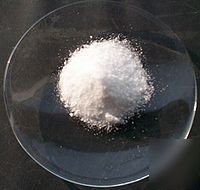Tristate Machinery Dismantlers Forum > WISCONSIN
> Machine Parts
> Used
> Without Warranty
> Potassium chloride (kcl) muriate of potash 1 lb 99%
Potassium chloride (kcl) muriate of potash 1 lb 99%
Package : 1lb = 452 g = 1 pound
The chemical compound potassium chloride (KCl) is a metal halide salt composed of potassium and chlorine. In its pure state it is odorless. It has a white or colorless vitreous crystal, with a crystal structure that cleaves easily in three directions. Potassium chloride crystals are face-centered cubic. Potassium chloride is occasionally known as "muriate of potash," particularly when used as a fertilizer. Potash varies in color from pink or red to white depending on the mining and recovery process used. White potash, sometimes referred to as soluble potash, is usually higher in analysis and is used primarily for making liquid starter fertilizers. KCl is used in medicine, scientific applications, food processing and in judicial execution through lethal injection. It occurs naturally as the mineral sylvite and in combination with sodium chloride as sylvinite.
The majority of the potassium chloride produced is used for making fertilizer, since the growth of many plants is limited by their potassium intake. As a chemical feedstock it is used for the manufacture of potassium hydroxide and potassium metal. It is also used in medicine, scientific applications, food processing, and as a sodium-free substitute for table salt (sodium chloride).
Potassium chloride is used as the third of a three-drug combination in lethal injection. Additionally, KCl is used (albeit rarely) in fetal intracardiac injections in second- and third-trimester induced abortions.
It is sometimes used in water as a completion fluid in petroleum and natural gas operations, as well as being an alternative to sodium chloride in household water softener units. KCl is useful as a beta radiation source for calibration of radiation monitoring equipment because natural potassium contains 0.0118% of the isotope 40K. One kilogram of KCl yields 16350 becquerels of radiation consisting of 89.28% beta and 10.72% gamma with 1.46083 MeV. Potassium chloride makes up 70% of Ace Hardware's pet and vegetation-friendly "Ice Melt" though inferior in melting quality to calcium chloride (0 F ( 18 C) v. 25 F ( 31.7 C)). It is also used in various brands of bottled water, as well as in bulk quantities for fossil fuel drilling purposes.
Potassium chloride was once used as a fire extinguishing agent, used in portable and wheeled fire extinguishers. Known as Super-K dry chemical, it was more effective than sodium bicarbonate-based dry chemicals and was compatible with protein foam. This agent fell out of favor with the introduction of potassium bicarbonate (Purple-K) dry chemical in the late 1960s, which was much less corrosive and more effective. Rated for B and C fires.
Along with sodium chloride and lithium chloride, potassium chloride is used as a flux for the gas welding of aluminium.
Potassium chloride is also an optical crystal with a wide transmission range from 210 nm to 20 m. While cheap, KCl crystal is hygroscopic. This limits its application to protected environments or short term uses such as prototyping. Exposed to free air, KCl optics will "rot". Whereas KCl components were formerly used for infrared optics, it has been entirely replaced by much tougher crystals like ZnSe.
Potassium chloride has also been used to create heat packs which employ exothermic chemical reactions,but these are no longer being created due to cheaper and more efficient methods such as the oxidation of metals ('Hot Hands', one time use products) or the crystallization of sodium acetate (multiple use products).
Biological and medical properties
Potassium is vital in the human body and oral potassium chloride is the common means to replenish it, although it can also be diluted and given intravenously. It can be used as a salt substitute for food, but due to its weak, bitter, unsalty flavor, it is usually mixed with regular salt (sodium chloride), for this purpose to improve the taste (for example, in Morton Lite Salt). Medically it is used in the treatment of hypokalemia and associated conditions, for digitalis poisoning, and as an electrolyte replenisher. Brand names include K-Dur, Klor-Con, Micro-K, and Kaon Cl. Side effects can include gastrointestinal discomfort including nausea and vomiting, diarrhea and bleeding of the digestive tract. Overdoses cause hyperkalemia which can lead to paresthesia, cardiac conduction blocks, fibrillation, arrhythmias, and sclerosis.
The lethal effects of potassium chloride overdoses has led to its use in lethal injection. Jack Kevorkian's thanatron machine injected a lethal dose of potassium chloride into the patient, which caused the heart to stop functioning, after a sodium thiopental-induced coma was achieved. A similar device, the German 'Perfusor', also uses potassium chloride as a suicide aid.
Orally, KCl is toxic in excess; the LD50 is around 2.5 g/kg (meaning that a lethal dose for 50% of people weighing 75 kg (165 lb) is about 190 g (6.7 ounces), or about 38 teaspoons). Intravenously this is reduced to just over 100 mg/kg, but of more concern are its severe effects on the cardiac muscles; high doses can cause cardiac arrest and rapid death, ergo its aforementioned use as the third and final drug delivered in the lethal injection process.

